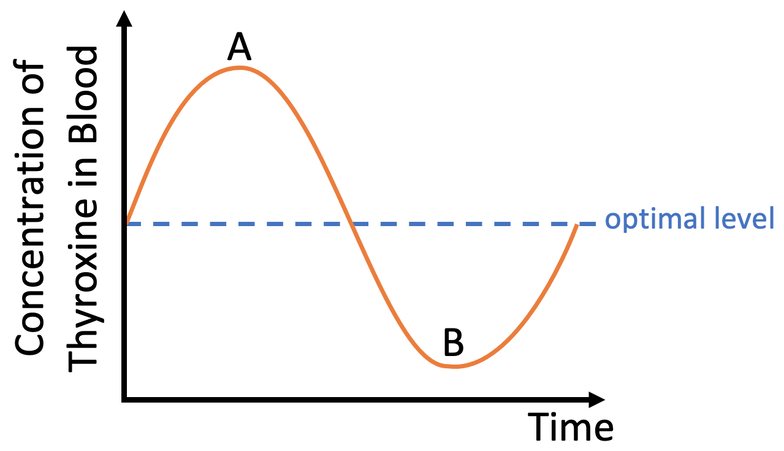Back to B5 Home
B5: Quiz 9
B5: Quiz 9
1)
a) What is the name of the hormone that is known as the fight or flight hormone?
b) What is the name of the glands that secrete the hormone in part a, and where are they located?
c) Give 3 effects that the secretion of the hormone in part a has on the human body.
2)
a) What gland produces thyroxine and where is this gland found?
b) Thyroxine controls BMR. What does BMR stand for and what does it mean?
c) If there is lots of thyroxine in blood, will BMR be low or high?
d) There is another hormone that controls how much thyroxine is produced.
i) What is the name of this hormone?
ii) What gland in the body secretes this hormone and where is this gland found?
iii) Will a greater quantity of this hormone in blood result in lots of thyroxine being secreted or very little thyroxine being secreted?
3) The graph below shows how the level of thyroxine in blood changes over time.
a) What is the name of the hormone that is known as the fight or flight hormone?
b) What is the name of the glands that secrete the hormone in part a, and where are they located?
c) Give 3 effects that the secretion of the hormone in part a has on the human body.
2)
a) What gland produces thyroxine and where is this gland found?
b) Thyroxine controls BMR. What does BMR stand for and what does it mean?
c) If there is lots of thyroxine in blood, will BMR be low or high?
d) There is another hormone that controls how much thyroxine is produced.
i) What is the name of this hormone?
ii) What gland in the body secretes this hormone and where is this gland found?
iii) Will a greater quantity of this hormone in blood result in lots of thyroxine being secreted or very little thyroxine being secreted?
3) The graph below shows how the level of thyroxine in blood changes over time.
a) Explain what happens at point A to bring the levels of thyroxine in blood back to the normal/ optimal level.
b) Explain what happens at point B to bring the levels of thyroxine in blood back to the normal/ optimal level.
4) Explain how an underactive thyroid gland can cause an individual to gain weight.
b) Explain what happens at point B to bring the levels of thyroxine in blood back to the normal/ optimal level.
4) Explain how an underactive thyroid gland can cause an individual to gain weight.

